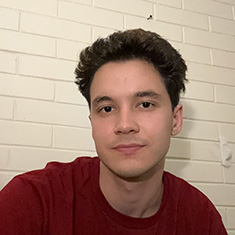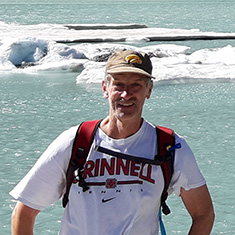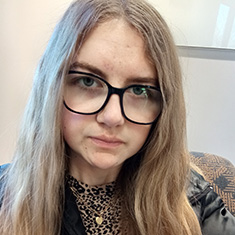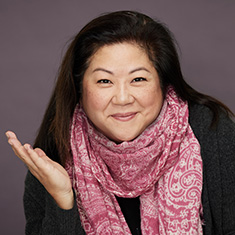MentorGrinnell has led to valuable student-alumni connections
 Timur Kasimov ’25
Timur Kasimov ’25
March 12, 2024 — Timur Kasimov ’25, a computer science and economics major from Uzbekistan, was looking for practical advice about breaking into the world of quantitative finance and developing algorithms for market trading, as well as leads for a summer internship.
He attained all those items with MentorGrinnell, a platform launched last fall to foster connections between students and alumni through mentorship. Using MentorGrinnell’s algorithm, Kasimov was a high match with Eric Eidsmoe ’84, a math and chemistry double major, who spent much of his career at Dow Chemical.
“One of the most common recommendations you hear is to get in touch with Grinnell alumni,” Kasimov says. “MentorGrinnell offered that opportunity in a really easy way. Conversations with Eric weren’t just immediately helpful on job search advice, but it also gave me a much bigger point of view on life, which I really appreciated.
MentorGrinnell replaced Grinnell Connect last fall. While Grinnell Connect offered a familiar LinkedIn-style approach, “It was really missing the mentor piece,” says Jessica Stewart, senior associate director of alumni and donor relations. MentorGrinnell puts its mentorship component front and center and offers deeper conversations and student-to-alumni connections.
 Eric Eidsmoe ’84
Eric Eidsmoe ’84
There are more than 100 alumni mentors currently signed up. The program has initially been mostly structured around connecting alumni and students based on industry sectors. Alums in a designated industry and students interested in that same industry go through an organized five-week experience. Stewart says that more identity-based cohorts will be in the mix moving forward. Last fall there was a First-Generation cohort, and a LGBTQIA+ cohort is in the works for the near future.
Whether it’s industry or identity-based, in either case, “Students are in the driver’s seat,” Stewart says, because the MentorGrinnell platform uses an algorithm to pair alumni and students based on students’ needs and interests.
Eidsmoe, a former Grinnell tennis player who met with Kasimov and another mentee through MentorGrinnell last fall, says that understanding a mentee’s needs, goals, and motivations is one of the most important parts of being a mentor. It’s something he picked up supervising a student internship program at Dow Chemical.
As a self-described “work to live more than a live to work type,” he explains that his view of a healthy work-life balance may be different from a mentee who aspires to be a CEO. The best thing a mentor can do is find some interest around common interests or hobbies and then “help them achieve those goals or take further steps along the line toward achieving those goals,” he says.
This was something that Cadance Hawk ’26, a second-year student from Illinois, really enjoyed about being paired with Nancy Ying ’96 as part of the First-Generation cohort. Hawk is no stranger to mentoring. She’s been a mentor as far back as high school and currently mentors at a Grinnell elementary school through the LINK Mentoring program.
 Cadance Hawk ’26
Cadance Hawk ’26
“Whether we realize it or not, we each have a bunch of mentors, both formal and informal,” Hawk says. “Mentorship is such an important part of life.” Hawk appreciated that Ying shared her interest in social change. “As a mentor, Nancy didn’t just show me her path,” Hawk says, “she showed me a wide variety of paths.”
Ying, a long-time Grinnell-in-Chicago regional community planning leader who recently moved to Seattle for a position with the Bill and Melinda Gates Foundation, says she’s benefited from mentors, with and without ties to Grinnell, and has reached a point in her career where she “can think about how I can help” with more depth and “broader conversations” than traditional networking alone.
Ying sees something of a parallel between mentorship and philanthropy. “It’s not always useful or sustainable to be prescriptive about what we think a mentee needs,” she says. “It’s always great to connect with a student, to hear what their concerns are, and meet them where they are.”
Once matched, Hawk was very specific about the advice she was seeking and that helped shape the time they spent talking together. “During our conversations,” Ying says, “I realized there were things I never thought about sharing before.”
 Nancy Ying ’96
Nancy Ying ’96
Five different MentorGrinnell cohort sessions have transpired this school year and the Health Professions and Government, Law, & Policy cohorts are going on now. Next up is the Education, Counseling, & Library Science from March 7 to April 11. Business & Finance will close out the academic year running April 5 to May 10.
Signing up for MentorGrinnell is simple. Alumni can share their LinkedIn profile, and the platform will auto-populate the information. Further short answer questions and prompts help alums grasp the skills they’re willing to share. Stewart says that communication and problem-solving skills are in high demand in addition to more sector specific skills.
Ideally, interested alumni should expect to commit to meeting an hour a week for five weeks, Stewart says, but if a student and an alum decide to go at their own pace, that’s OK too. The experience can continue after the five weeks if both mentor and mentee are interested and available. The Together platform has a resource library that’s geared toward helping first-time mentors. It also offers prompts and activities to help students and alumni make the most of the sessions. “You can use these as a guide or choose your own adventure,” Stewart says.
Stewart encourages young and recent alumni – particularly people between five and ten years out – to “think of themselves as mentors” and participate. “Students can really see themselves in a young alum who’s starting their career and figuring it out,” she says.
— by Joe Engleman ’14